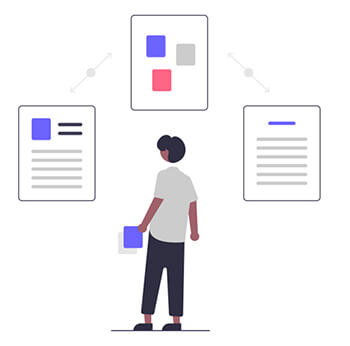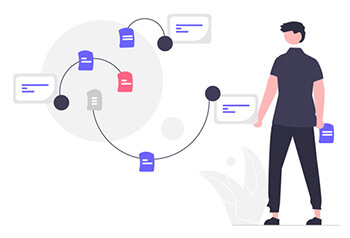7 Soft Skills for Success as a Software Engineer
See also: Project ManagementMany people are wrong when they think that in order to get success as a software engineer, it is only important to have knowledge in software development.
Writing the code is still a crucial criterion when choosing the right developers for hire to the team, but more and more companies are looking for someone who will complement their team not only with developmental skills but also with soft ones.
In this article, we consider the most important skills that will help you be competitive in the market.

What are Soft Skills?
The term ‘soft skills' doesn’t have one definition, but it is these skills that define how you communicate and interact with other people, and how easy it is for them to interact with you. Many companies want to hire developers with good soft skills because it certainly affects how the team works together. And when some people are naturally born with good soft skills, for some others they may become an obstacle when trying to show employer reasons to hire them.
Soft skills consist of many traits such as communication skills, empathy, patience, teamwork, etc. So let’s look at seven top skills needed to be a software engineer.
Skill 1: Teamwork and collaboration
During your work as a software developer, it doesn't matter if you work offshore, for an outsource company, or directly in the office, you will work more with a team than alone. A lot of developers underestimate the importance of knowing how to work with a team. The right teamwork and collaboration will determine if the project is successful or a failure. For this reason, we recommend not only making sure that you have all important hard skills but also soft skills as well.
No matter what you do, what project you’re on or where you work, at some point you will have to work with the team. It can be a team of other developers, designers, or managers that will work on the same mobile app (for example) and together you will have to go through all the stages of app development. Hence, this way of working well in a team will benefit you, your colleagues and the company itself.
Enterprises, startups, and organizations across the board are recognizing the value of a holistic skill set in candidates. For instance , Jelvix, a trailblazer in the tech world, exemplifies this with a reputation for fostering a work environment that thrives on collaboration and adaptability, as well as delivering top-notch software solutions. Jelvix sets the standard for the modern software engineer.
If you think about it, you may notice that to solve a problem at work, most of the time you will have to do that in conjunction with someone else and not alone. Problem solving requires you to be able to work in a group, know how to help other people, and let them help you when needed. It is crucial to understand that difficulties may arise or mistakes can be made, but if you know how to solve different kinds of problems, then you’ll have another reason why companies may want to hire you.
Skill 2: Communication

Another skill needed to be a software developer is knowing how to communicate. It is associated with the previous skill as it is connected to being able to properly share your ideas, thoughts, and opinions with others. Most of the time, when we think about software engineers, we imagine them sitting alone in a room with a computer and working as remote developers. But in reality, if you want to become a successful developer, you will have to learn how to express your thoughts, share ideas, and ask for advice, etc.
This can become an issue for those who work remotely because you don’t see people you work with. But there are many apps that can help you.
The best way to organize communication in the team is to learn and recognize project details right at the start of it. Try asking as many questions as possible, give your honest opinion, and listen to what other people have to say as well.
Skill 3: Time management
Have you ever noticed how much time you spend planning your work, communicating with your team members, and actually doing the work? Knowing exactly how much time you need to resolve big and small tasks can help you better plan and execute tasks(and for remote developers, it is even more important). Managing your time and development process will not only allow you to meet your deadlines and focus on what is more essential but also work efficiently. You will also need to provide an exact estimation of when the work will be completed, and this can also be difficult if you don’t know how to manage and balance your time and work. That’s why most companies, when they want to hire a dedicated developer, ask them about their ways of planning the work and managing it because sometimes your poor time management can affect the team’s results, disappoint clients’ expectations, and mismatch the budget. Because of this, time management is one of the most essential software engineer soft skills.
Thanks to modern technologies, there are many software products and apps that can help you to be more productive and organized. You just need to try some of them and find your perfect one for efficient time management.
Skill 4: Problem solving

Another software engineering skill that will help you on the way to becoming a successful software developer is problem solving. Critical thinking and knowing how to find creative solutions to problems is what makes you a good software engineer. At first, you may think that this skill is more of a hard skill than a soft one. But, let us tell you why it is on this list.
Software developers skills like problem solving and critical thinking are what makes you a good or bad engineer. Every great project starts from acknowledging the problem and then solving it. You will have to find a way of translating the solution into the code. You will face different kinds of difficulties along the way because it is what software engineer skills are all about and because of that you will have to use problem solving constantly. Sometimes the issues you’ll face will be connected to something other than code, for example: working with different teams, meeting deadlines, and you’ll have to solve different problems in order to succeed.
Skill 5: Emotional intelligence
We have come to fifth soft skill required by software engineers. Not many people understand what it means to have emotional intelligence, but it is really important at work. Having emotional intelligence means that you have empathy towards other people, you can understand why they feel a certain way, and it is easy for you to put yourself in someone else’s position. Empathy is essential during the web app development process because you have to understand other people’s feelings, emotions, and the reasons behind their actions. Also, you have to keep in mind that everyone has a different background and what is obvious to you may be completely new information for someone else. Trying to walk in another person’s shoes leads to better relationships within the team and more productive work.
Skill 6: Helpfulness
At some point, no matter what stage of mobile app development it will be, someone may ask you for help. This is why helpfulness is on the list of software developer skills. It can be something as simple as asking for your opinion or something more difficult like helping with debugging. The main thing is to be approachable and let your colleagues know that they can ask for help. If you don't help others, then nobody will help you as well and vice versa. Also, helping colleagues with their tasks may strengthen your team and positively affect your productivity and efficiency as a team.
Helpfulness is one of the critical skills needed to be a software developer. This can also help you in learning something new from the people you work with. And if you establish a correct connection with people, they are more likely to assist with achieving your personal or team goals.
Skill 7: Adaptability

We can’t create a list of the top soft skills required by software engineers if we don’t include adaptability. During app development, new issues can arise that you have never encountered before, and you may need to find solutions to them that you’ve never thought of. If you are not adaptable in such situations, it will be hard for you to stay calm and think straight. Instead, you may find yourself panicking and feeling lost. In this way, you could waste time not doing important tasks when you could have calmed yourself down and tried to think of measures that you could take in order to resolve the problem quickly and without loss. Adaptability is also important because in the tech world everything changes really fast. New technologies emerge, trends and apps appear, competitors will constantly try to think of something new, and you need to ,first, follow all the changes and, second, adapt to the changing conditions.
Adaptability can help in other cases as well. For example, you as a software engineer will have to work as a part of international teams, where people will be from different countries, of different nationalities, speaking different languages, and belonging to different cultures. In this case, you will have to learn how to interact with people in these circumstances. And these connections will be the key to the team’s and project’s success.
If you are adaptable to different situations and people, it means that you are open to new ideas from your co-workers, company, and even clients.
To sum up
The list may look or feel a bit overwhelming. But now you know that it’s not just experience and hard skills in development and testing that matter, you need to have soft skills as well. In most cases, it is how you connect and communicate with people that counts. Your soft skills are your benefits and they can differentiate you from other candidates. We hope that this list will help you in appreciating your advantages or discovering new ones.
About the Author

Michael Ruzew is a full-stack developer and team leader at Clockwise.Software with more than 6 years of experience in the industry. He finds inspiration in everyday tasks and turns routine JavaScript coding into the creation of unique user experiences. Being an avid learner, he checks out every novelty in the tech world and doesn’t miss an opportunity to improve his skills.
